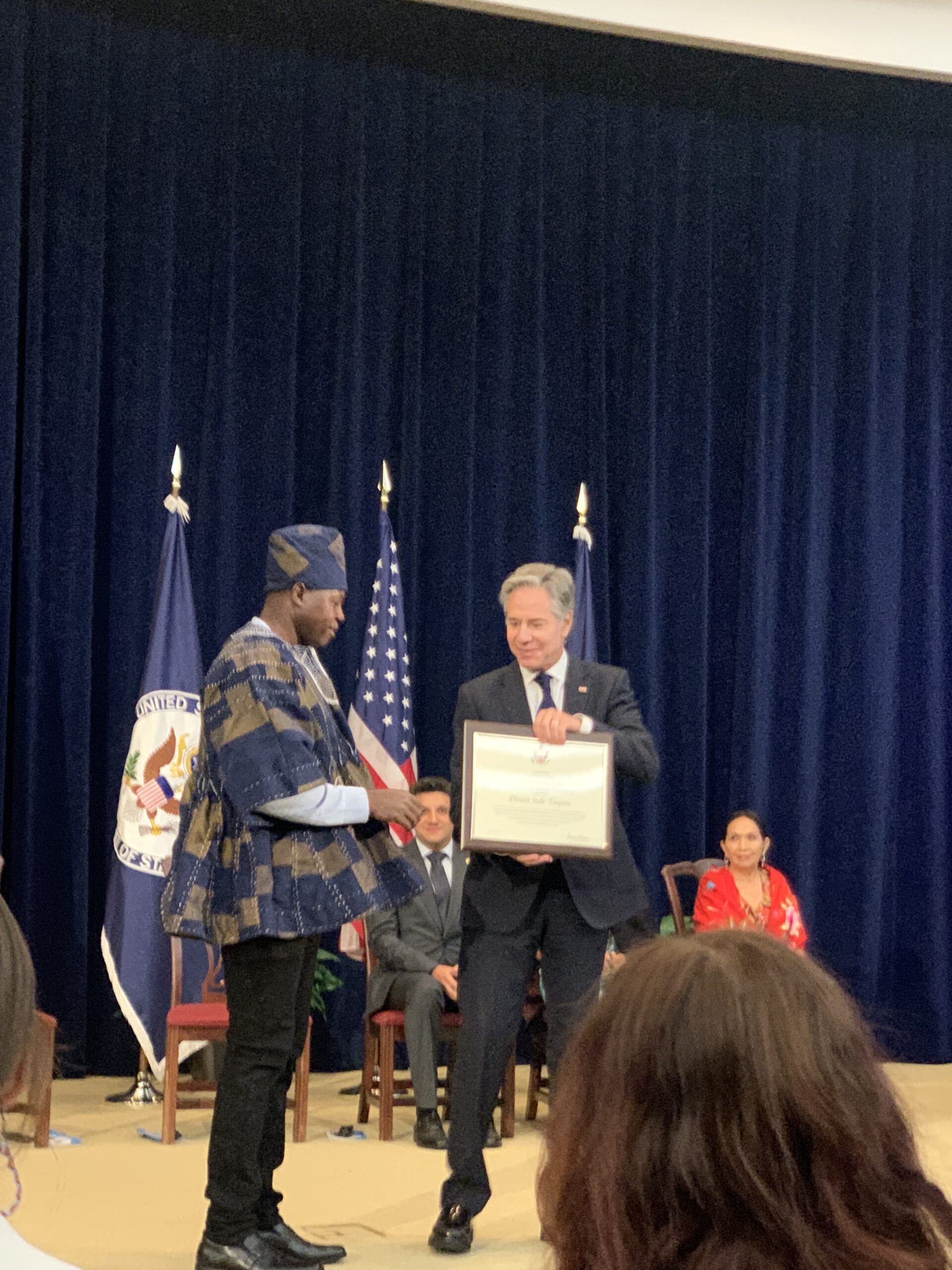
Sule (left) receiving the award from US Secretary of State Antony Blinken (right) at the US State Department on October 21, 2024.
November 4, 2024:
Dinte Tayiru Sule, a 2024 U.S. State Department “Global Anti-Racism Champion”.
The national elections in Ghana in 2008 were seen by two young friends in Tumu, a town in the Upper West region of the country, as a profound challenge. Dinte Tayiru Sule and Kingsley Kanton knew that the elections in the Upper West Region, with its population of more than 900,000 had to be independently monitored, that citizens needed to be well informed about voting and that they needed to trust the results.
The two friends turned to the Partnership for Transparency Fund to work with them, securing funding to strengthen their monitoring efforts, and obtain technical advice as they planned their campaign, which deployed around 200 election monitors covering all of the polling stations in the Sisaala East and West Constituencies in the Upper West Region.
Sule and Kingsley registered SAVE Ghana as a civil society organization that year. Their monitoring in the first round of the elections stimulated significantly increased public interest, leading to a substantial rise in the number of citizens going to vote in the second round, run-off election.
HIV/AIDS and COVID-19
Sule and Kingsley started SAVE Ghana 20 years ago, when they were both in their 20s. They had both worked in the public sector and were convinced that more transparent and accountable public institutions would better serve citizens, especially the poorest citizens. In their first four years they pursued a range of different projects, and none was more urgent as they started their work than providing information to the public on many aspects of the HIV/AIDS epidemic that was raging at the time.
Incidentally, that experience would prove valuable when many years later they addressed the COVID-19 pandemic. Sule explains that citizens needed to understand what COVID-19 was, they needed to understand how best they could protect themselves, and what public services were available to them – and obtain those services honestly and efficiently.
Working again with PTF, SAVE Ghana ran a successful campaign, encouraging the public to directly call on public health services, and so mobilizing public pressure to achieve the key objectives. They ran a popular public information campaign via a weekly radio program, entitled: “The People Should Know” with the objective of widely disseminating information on the COVID pandemic, and inviting public officials to answer Tumu residents’ questions via a prepaid phone-in program.
Working with PTF
Says Sule: “PTF gave us technical advice as we moved ahead with our COVID campaign, which was probably more important than the money we received. PTF has a unique group of internationally experienced experts who have been able to work with us as real partners, helping us to strengthen our plans, and, in fact, co-creating projects. Then, PTF engages with us and other long-time African partner CSO’s after the projects have been completed so we can share the knowledge that has been learned – very few other international organizations do this.”
Today, SAVE Ghana has 17 full-time staff and about 10 volunteer student interns. The organization has remained locally based and focused on Tumu, in the Northern region of Ghana. It works with a range of international organizations and finds that PTF’s efficient, pragmatic approaches consistently ensure successful results – often greater public benefits than larger grants from some other international organizations.
Sule says: “PTF knows us and is interested in our work – it does not demand details on how big our office is, how many academic degrees are held by the staff and how large our organization is. We have demonstrated that small organizations can make a big difference, especially in a region like ours in Northern Ghana, which is far from a big city and therefore often receives important information with a significant delay.”
Building trust in the communities that SAVE Ghana serves, as well as with public officials, is central to the organization’s achievements. Sule notes: “We have developed a non-confrontational appreciative model of advocacy for greater transparency and accountability. The model has been effective in elections, in education and in healthcare. PTF has been helpful here in sharing with us the joint perspective that consensus building and cooperation are much more effective than confrontation for achieving results and longer-term impact.”
A sample of SAVE Ghana and PTF projects:
Bridging Gaps in Education: How Constructive Engagement Revitalized School Communities in Ghana
Strengthening Stakeholder Engagement and Improved Governance in the COVID 19 Response in Ghana
Election Monitoring in Ghana – 2008
Promoting Accountability and Responsiveness for Improved Basic Education in Ghana (2011)

